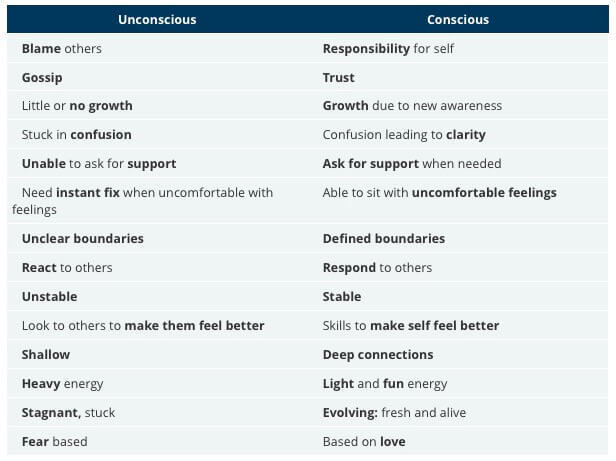Estimated reading time: 3 minutes
We would never create a life of pain, discomfort or difficult relationships consciously. These situations are created from the unconscious part of ourselves.
Expanding our consciousness does require some effort, regarding training our mind to be peaceful rather than reactive. However, the more conscious and peaceful we become, the more we can rise above mental and physical suffering—consciousness is our ticket to freedom, joy, and bliss.
The Difference Between Acting Unconsciously and Consciously

Meditation is wonderful to train our mind to go beyond reactivity, stress, and worry that can create problems in our relationships. A restless mind is the cause of all our challenges. When our mind is still and calm, the world will seem that way too. Our world is like a mirror to us reflecting back our energetic state. Even just meditating for ten to twenty minutes per day trains our mind to become resilient so that if we do find ourselves in difficult situations we are less likely to react and more likely to respond from the wise and kind part of ourselves. Meditating helps us to develop the ability to reconnect with the conscious part of ourselves that makes decisions that are in our best interest.

Conducting our relationship consciously has a big impact on the way we relate to the people we love. Ideally, we can develop the ability to be light and easy in our relationships. If possible rather than discussing things when they have become a big issue for us it is ideal to discuss things in a light and easy way as they come up. John Gottman, relationship expert and co-founder of the Gottman Institute, has found that people who have mastered successful relationships bring up problems gently and without blame (Gottman’s Marriage Tips 101, 2004). They can express what they feel and what they need gently.
Discussions invariably end on the same note as they begin ~ John Gottman
The more conscious and aware we are of our thoughts and feelings, the more present we can be with others. When we are with someone, giving them our full attention, rather than letting our mind taking us elsewhere—allows us to hear what they are saying and be able to give meaningful responses. Deeply listening without judgement is one of the kindest gifts we can give others.Examining and being aware of the way we are in our relationships allows us to make choices around them. Relating to others in a loving, kind way brings deeper understanding and connection.
Awareness allows us to grow.
To discover more about conscious relationships see: Love Now eCourse







